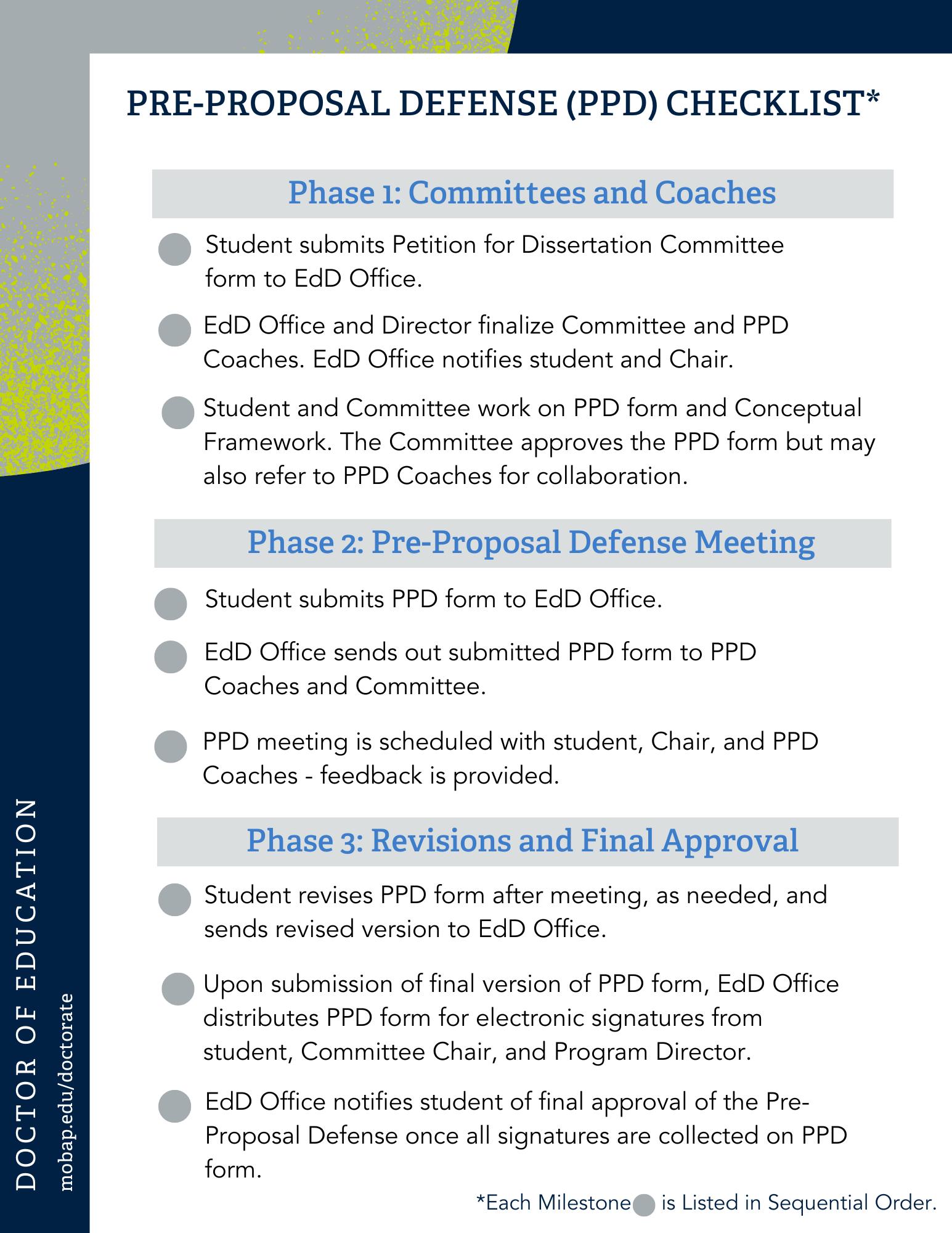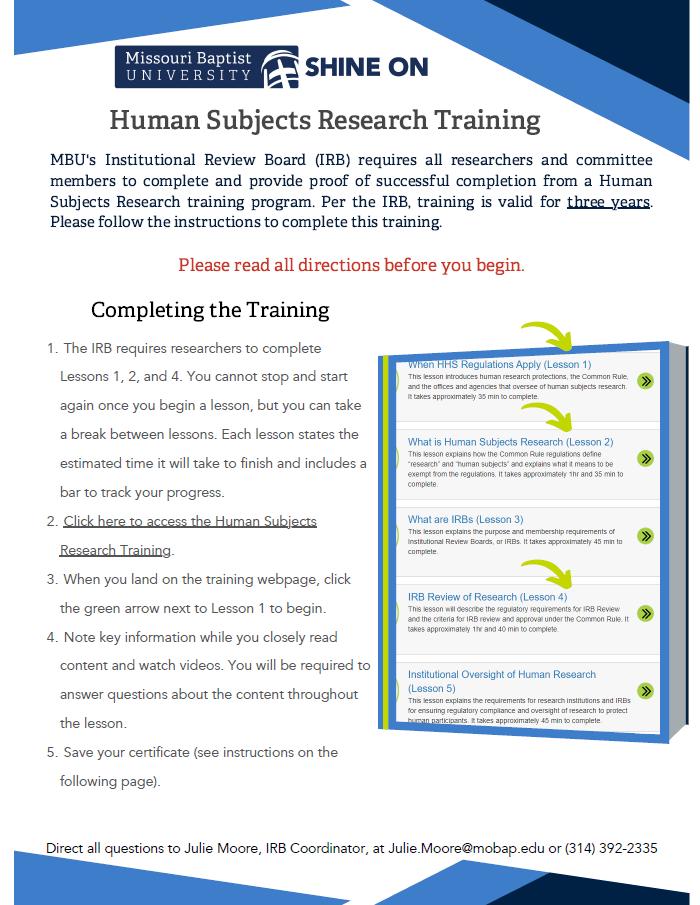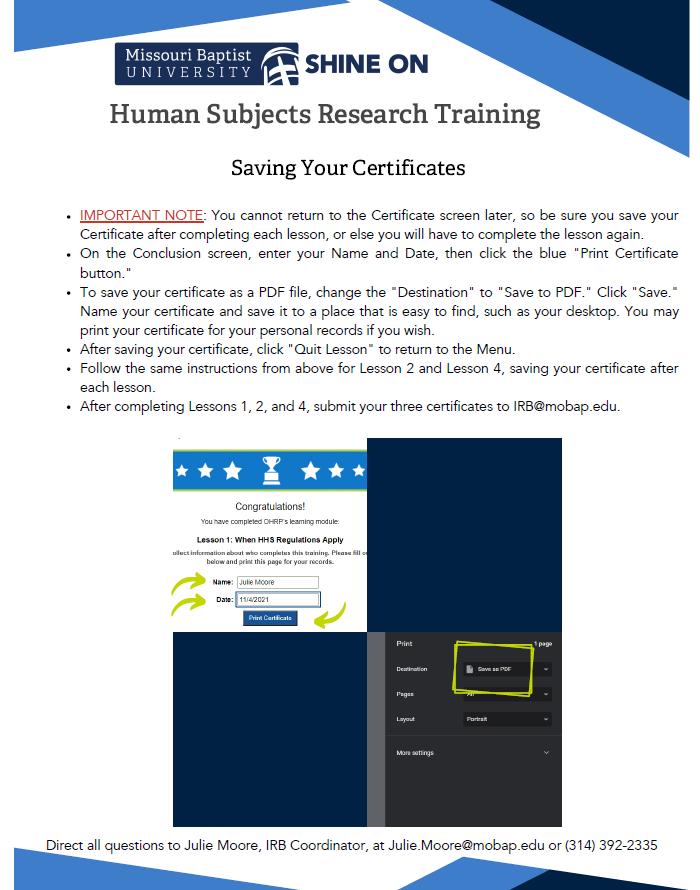





Email: Melanie.Bishop@mobap.edu
Voice: 314-392-2323
Dr. Melanie Bishop is the Vice President for Graduate Affairs at Missouri Baptist University. Her responsibilities include leading all graduate studies at the University. She collaborates with academic leaders to develop new graduate programs while also ensuring excellence in our existing 22 Master’s, 2 Education Specialist, and 2 Doctoral programs. She oversees the graduate advising and doctoral office staff. Dr. Bishop also works closely with the Graduate Admissions office to review enrollment and strategize future growth.
Before her three years of service as the VP for Graduate Affairs, she was the Dean of the School of Education for seven years. Before working at MBU, she worked with future teachers at St. Charles Community College and Lindenwood University. Melanie served on the school board at Westgate Christian Academy and Living Word School District during those years. Before that, she stayed home with her two sons, Roman and Dane. Before having children, Melanie taught for eight years in the Fort Zumwalt, Pattonville, and Rolla School districts as a middle school and high school math teacher.
Melanie has been married to her husband Brian for 25 years. She and her family live in St. Charles County. They enjoy the ocean, kayaking, biking, and the outdoors. Melanie is passionate about preparing the next generation and helping students fulfill their dreams and goals. She feels very blessed to pursue her calling in a faith-based institution where integrating faith and learning is the cornerstone of its mission.
Email: Margaret.Miller@mobap.edu
Voice: 314-485-8465
Margaret Miller is the Coordinator of Doctoral Student Services She joined the EdD Office in January 2022 In her current role, Margaret manages the operations of the EdD Office and serves as the academic advisor for doctoral students

Margaret earned her B.A. in Anthropology and History with a minor in Religion at Augustana College and her M.A. in European Studies at New York University (NYU) Her graduate research examined Central and Eastern European identity and cultural productions with a focus on the production of Austrian identity in cuisine. Prior to joining MBU, Margaret worked at several universities in various administrative positions, served as an English teacher in the Czech Republic, and was a Senior Legal Assistant in Atlanta, GA.
Originally from South City St. Louis, Margaret is married to Micah, and they currently live in Washington state. They love traveling, hiking, cooking, gardening, and spending time together.
Email: @mobap.edu
Voice: 314-392-2335
Maureen Pederson, IRB Coordinator & Doctoral Office Assistant, earned her B.S. in Athletic Training from Quincy University in 2001. She and her husband, Chris, married in 2002 and have four children ranging from elementary to high school age. They live in southern St. Louis County where they enjoy backyard gardening and training their Australian Cattle Dog, Lucy. Exploring the outdoors and being immersed in God’s creation through camping and hiking are favorite family activities. They also enjoy cheering one another on from the sidelines and seeing the joy in their kids when they succeed.
In her role as IRB Coordinator, Maureen acts as a liaison between researchers and the IRB Committee. In her role as Doctoral Office Assistant, she provides support and assistance to the Doctor of Education program. Maureen is excited to be a part of the MBU community!
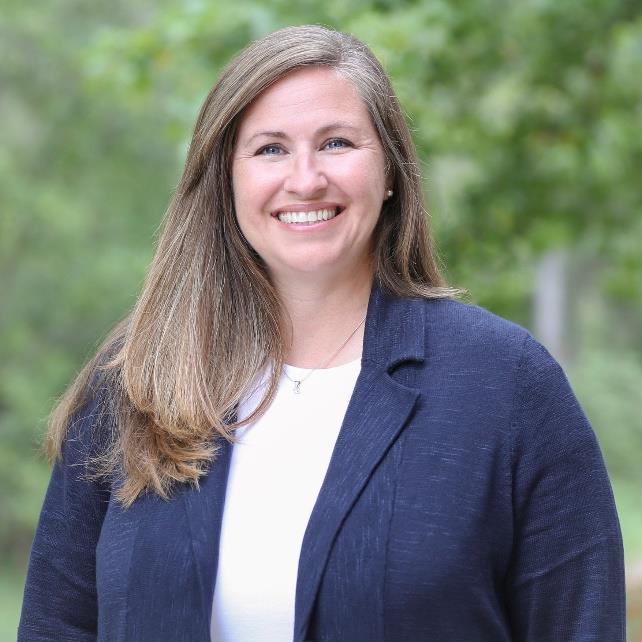
Associate Dean of the School of Education Leadership / Assistant
Professor of the College of Education
Director, EdD in Leadership in Teaching and Learning
Email: Jane.Brown@mobap.edu
Voice: 314-485-8452
As the Associate Dean of the School of Educational Leadership and the Director of the EdD in Leadership in Teaching and Learning her responsibility is to oversee the preparation programs for aspiring and current leaders in the areas of building level administration, curriculum and instruction, and district-level leadership roles and responsibilities.
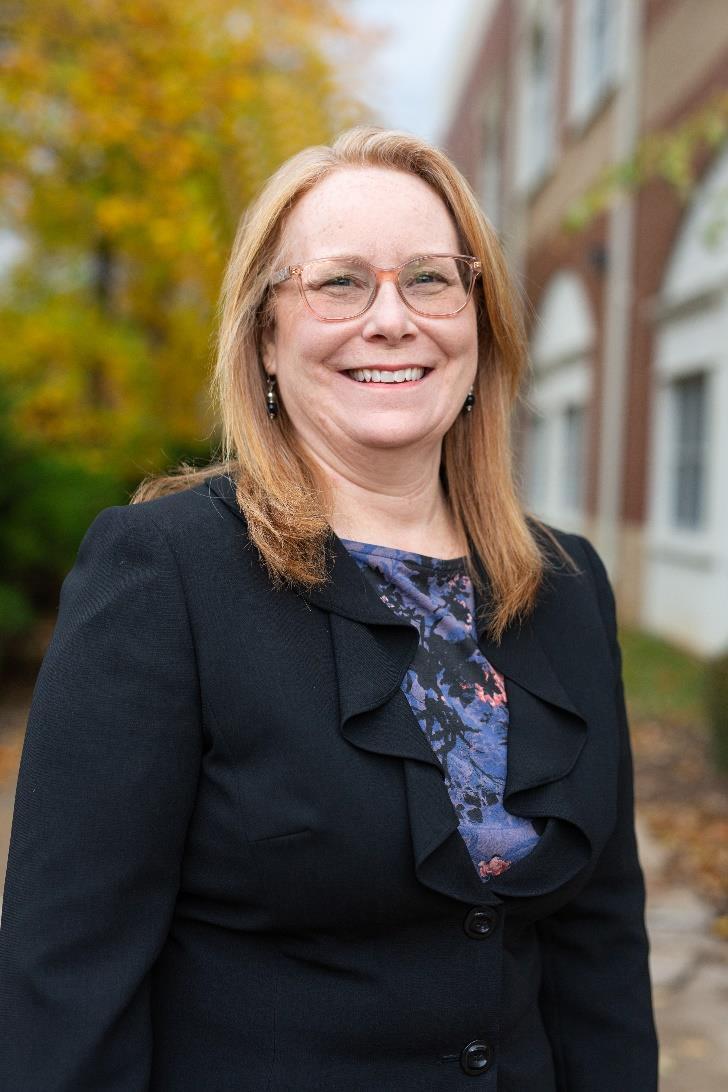
Her formal educational training includes a degree in Elementary Education with an emphasis in Early Childhood Education from Southwest Baptist University, with lifetime certification in both of those areas; a Master of Educational Administration and Principal Certification from Missouri State University; an Educational Specialist in Educational Leadership and Policy Analysis from the University of Missouri – Columbia; and an Ed.D. in Leadership in Teaching and Learning from Missouri Baptist University.
Her teaching and administrative experiences in education include teaching kindergarten, second grade, third grade, and sixth grade over 12 years. Additionally, she was a parent educator in the Parents As Teachers program. Her administrative experiences include two years as an assistant principal, ten years as a building-level elementary principal, three years as a Director of Differentiated Services, one year as an Executive Director of Elementary Schools, and four years as an Executive Director of Early Childhood and Special Education. She worked in higher education for several years as an adjunct, teaching at Missouri Baptist University and William Woods University, while still working as an administrator in public schools.
Jane has been married to her husband Kyle for 39 years and they have two adult daughters, Mikail and Mallory. For pleasure, Jane loves to travel, read, hike, and hang out with her family.
Email: Amy.Harrison@mobap.edu
Voice: 636-208-8688
Amy Harrison (Brinkley) earned her PhD at Saint Louis University in 2016. She also has degrees in English (BA, MAT, MA). In her primary role, she oversees the master’s and doctoral programs in higher education and serves on numerous dissertation committees to supervise and guide student research.
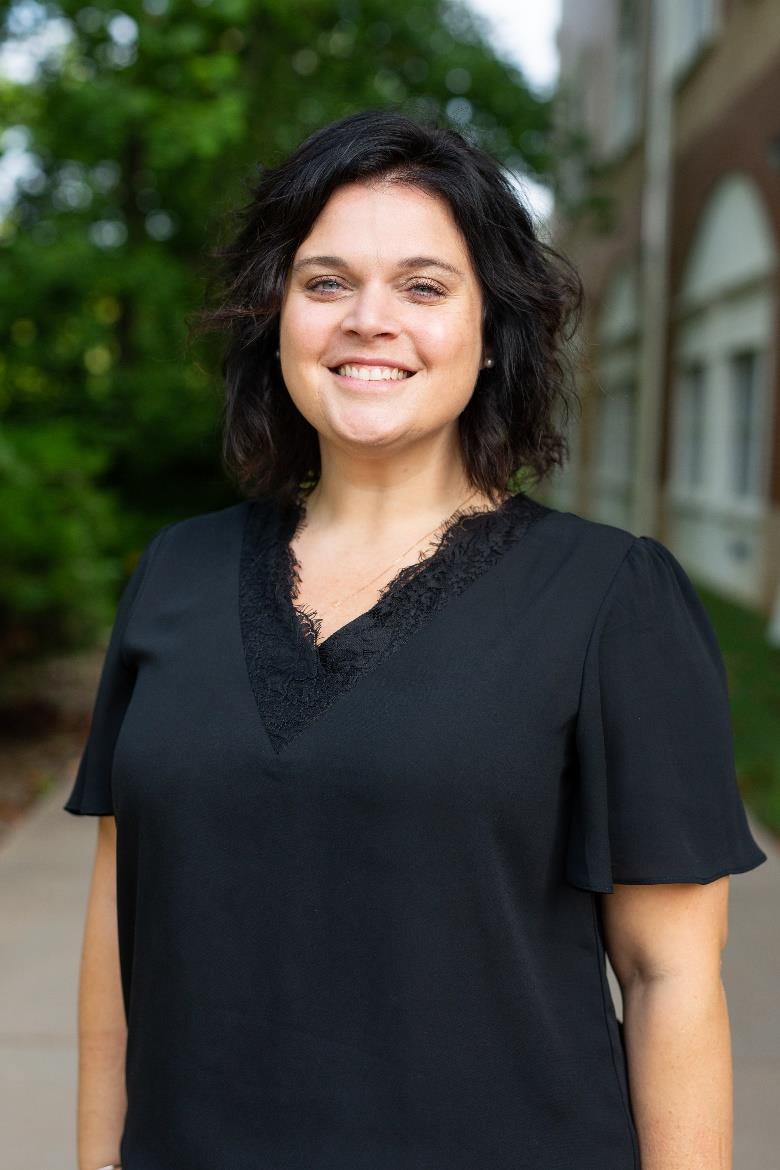
Her secondary role at MBU allows her to direct and teach the university’s first-year orientation experience called The Keynote. The goal of that course is to develop conversations around three key intersecting points for MBU students: their identity, a Biblical worldview, and the faith-based mission of MBU. Amy also leads student groups on an annual service trip to First Step Academy, a small school she cofounded in 2015 in Ghana, West Africa. Her research interests include Christian higher education, doctoral pedagogy, narrative inquiry, and child’s rights and education in Ghana.
Amy is married to Josh, and they have two children, Kobe and Hailee. Together, they live in a rural Missouri town and enjoy gardening, traveling, and all things the simple life.
The EdD programs are an outgrowth of Missouri Baptist University’s (MBU) mission of “preparing students to serve in a global and culturally diverse society” and the School of Education’s mission to develop “reflective, problem-solving professional educators of excellence.” The EdD programs are a natural extension of academic programs, projects, and community activities that are already in place.
The added dimension of the educational doctorate is to build a “culture of applied research” to serve the Pk-12 and higher education community locally, nationally, and internationally. The emphasis will be on creating climates that help administrators and faculty make changes in the context of teaching, learning, and leadership.
The first core value of Missouri Baptist University is that “We are serious and intentional about our Christian faith.” Thus, MBU commits itself to a Biblical worldview that drives our teaching, leadership, and service toward the MBU community and beyond. While MBU does not require students to share the same worldview or belief system, it is the position from which we approach the most fundamental questions about who we are and who are constituents are.
According to Genesis 1:27, that humans are created in the very image of God, the biblical worldview compels MBU to serve one another with equality, reconciliation, and justice because each person is an image bearer of God. That is the foundation of our beliefs regarding creation and our response as scholars and practitioners to the ultimate end restoration and reunification of creation to a holy, triune God.
MBU is committed to maintaining a community that recognizes and values the inherent worth and dignity of every person. MBU affirms that an important part of the integration of faith and learning is the recognition that all people are created in the image of God and are thus worthy of respect of dignity. MBU administration, faculty, and staff seek to ensure that all students have full access to the educational, social, and spiritual growth opportunities that MBU provides to ensure that students understand and appreciate one of the University’s core values of “social change through service and leadership.”
Through its curricula and classroom experiences, MBU seeks to develop and nurture diversity because it strengthens the organization, promotes creative problem solving, and enriches all its members. As such, MBU faculty endeavor to present materials and activities that are respectful
of diverse groups including, but not limited to, race, gender, color, national or ethnic origin, age, qualified disability, military service, learning differences, or socioeconomic status.
Missouri Baptist University supports two doctoral programs, both with a distinct focus and unique curriculum. Through their curriculum, instruction, and research practices, the EdD in Higher Education Leadership and the EdD in Leadership in Teaching and Learning both support MBU’s Core Values:
1. We are serious and intentional about our Christian faith.
2. We will freely and responsibly search for truth.
3. We strive for excellence.
4. We believe in the importance and cultivation of character.
5. We believe in social change through service and leadership.
A doctorate in Higher Education Leadership from MBU is preparing the next generation of higher education administrators to steer institutions with vision and integrity. The opportunities and challenges of governing higher education in the 21st-century demand from its leaders a well-informed position on a range of issues, which our program is designed to do through a unique practitioner-scholar model. MBU’s faculty emphasize the practical application of scholarly knowledge, thus enabling students to make substantive contributions to the field and their institution.
The courses reflect an integrated approach to higher education leadership: adult education, human resource development, and organizational management. The program’s philosophy is modeled in andragogy where students are given a considerable amount of latitude in their learning process. The curriculum has been uniquely and intentionally designed so that students will work on their dissertation within the coursework, guided tightly by faculty and their committees. This unique and supportive approach allows students to complete the degree dissertation included in 2.5 years.
Graduates of this terminal degree will be prepared to lead the evolving industry of higher education and address prominent issues expected to face the next generation of college and university administrators.
The EdD in Higher Education Leadership is a 42-credit hour program offered online with classes rotating every 12 weeks. Students can complete the program and the dissertation within 2.5 years. Students are required to attend a 3-day Doctoral Residency and Professional Development Retreat on MBU’s main campus during the first term of classes to satisfy the residency requirement.
The primary audience for the EdD program consists of educational professionals who aspire to be or who are already serving as presidents, vice presidents, deans, department chairs, as well as faculty and administrative staff in colleges, universities, other post-secondary education settings, and other non-profit ventures. To be considered for admission, applicants must possess a completed master’s degree.
The Doctor of Education (Ed.D.) in Leadership in Teaching and Learning program is a practical degree program that builds on an earned Specialist Degree or its equivalent. It is designed to meet the needs of professional administrators and leaders in areas such as curriculum and instruction at the PK-Grade 12 district level. The program emphasizes the development of leadership in teaching and learning strategies that assist schools in promoting a culture of learning, inquiry, innovation, continuous improvement, and equity. The focus on leadership in teaching and learning in this program places achievement in the broader context of scholarship and lifelong learning.
The added dimension of the educational doctorate is to build a “culture of applied research” which will continue to serve both the PK-Grade 12 and higher educational community.
The EdD in Leadership in Teaching and Learning is a 24-credit hour program with 7 courses. The primary delivery method of 4 of the courses is face-to-face, 1 course is primarily online, and 2 courses are independent as the candidate works on focused dissertation writing. Classes meet one night per week.
The primary audience for the EdD in Teaching and Learning consists of educational professionals who aspire to be or who are already serving as superintendents, assistant superintendents, college instructors, and curriculum coordinators, although there may be some interest from building-level leaders and administrators as well. To be considered for admission, applicants must have a completed EdS degree or the equivalent in postmaster’s level study.
The EdD programs emphasize the needs of learners within the following themes:
• Leadership in Teaching and Learning – used as a lens through which decisions are made and problems are solved;
• Applied Field Research – a component of individual courses, as well as the culminating dissertation;
• Diversity – diverse experiences working with diverse populations;
• Innovation – active engagement in applying new knowledge and understanding within continuous improvement to drive effective change;
• Service to the Community – following the mission of MBU to “prepare students to serve in a global and culturally diverse society”; and
• Reflective Practice – The core component of the School of Education’s Conceptual Framework.
These themes reflect the focus of the EdD programs to prepare today’s leaders in the areas of visionary leadership, instructional leadership, relational leadership, managerial leadership, and innovative leadership
Students in the EdD programs at Missouri Baptist University will:
• Demonstrate the ability to engage in original, field-based inquiry and research;
• Engage in moral and ethical decision-making using analytical and interdisciplinary methods for assessing the complicated financial, political, and cultural issues and dilemmas facing education systems;
• Demonstrate the ability to collect and evaluate data to make strategic decisions and changes in policies and processes in diverse educational settings;
• Demonstrate critical reflection in analyzing multi-faceted problems and developing creative solutions for resolving these problems; and
• Demonstrate leadership skills in assessment, problem-solving and both short-term and long-term strategic planning.
The Missouri Baptist University Graduate Bulletin, updated annually, contains general information about the EdD programs and the curriculum for each concentration. Doctoral students are subject to the graduation requirements of the bulletin from their first quarter of the EdD program.
The Doctor of Education Student Handbook should be considered an official supplement to Missouri Baptist University’s Graduate Bulletin. The EdD Student Handbook contains policies, procedures, and other additional information that govern the EdD programs. The student is responsible to comply with the regulations contained in the EdD Student Handbook, as well as the MBU Graduate Bulletin and Spartan Virtues, which is the central document for the rights, responsibilities, Code of Conduct, and other policies governing students. Both documents are available on MBU’s website.
In addition to the official institutional documents mentioned above, the student should respond to and abide by any oral and direct written communication from the EdD Office. All students must maintain a valid email address, current physical address, and contact numbers with the EdD Office in order to expedite official communication.
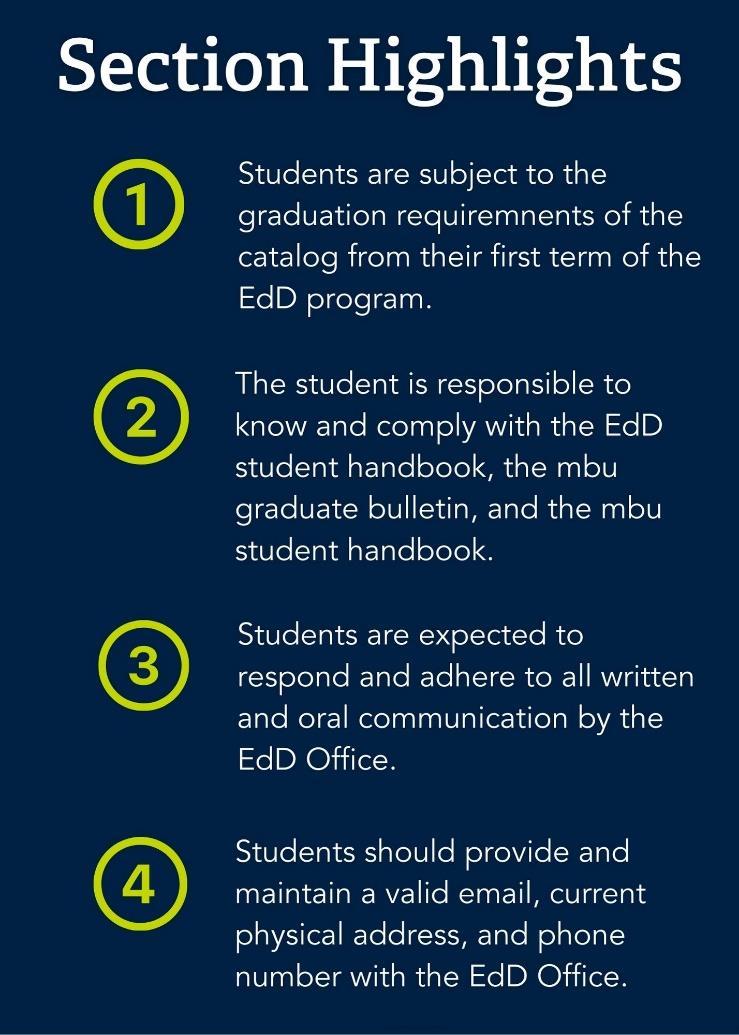
myMBU is the landing page for students and faculty to access relevant forms, email, and Canvas, the University-sponsored Learning Management Section (LMS). Upon starting the doctoral program, students should use only their MBU student email to communicate with MBU faculty and staff. In addition, all communication from MBU will only be sent to the student’s MBU email. See Appendix A for more details.
Canvas is the designated LMS for all MBU coursework. See Appendix B for tips and tricks to navigate and use Canvas.
Print Collections
• MBU Library Catalog contains over 31,000 books, DVDs and more.
• MOBIUS Catalog contains over 31 million items from libraries across Missouri. Requested materials arrive within 3-5 business days.
Digital Collections
• EBSCO eBooks contains more than 200,000 eBooks available on and off campus.
• Journals A-Z lists all print and electronic journals, available through MBU.
• Research Databases: To access, visit libguides.mobap.edu and click on Databases
• Interlibrary Loan (Article Requests) enables you to request articles not available through MBU, visit https://www.mobap.edu/student-life/library/interlibrary-loan/articlerequest-form/. Articles will be delivered as PDFs via MBU email.
Services
• Publishing Assistance is provided to assist in publishing graduate scholarship in academic journals.
• Data Management Services assist with the storage, preservation, sharing, and description/formats of research data.
• Digital Literacy instruction assists in understanding how to effectively research using databases and other digital formats.
• Reference Services help with research strategies through one-on-one guidance.
• Citation Assistance will review documentation for citation related errors.
• Chat Services are available 24hrs during the week and most hours during the weekend.
• Zotero Resource Manager is available to assist with storing documents and research data for easy citation and documentation. More info at libguides.mobap.edu/Zotero.
Contact Information
• Email: library@mobap.edu
• Voice: 314-392-2320
• Web: libguides.mobap.edu
The Coordinator of Doctoral Student Services in the EdD Office is the academic advisor for all EdD students. The EdD Office and its staff report directly to the Vice President for Graduate Students, whose position is responsible for the vision and implementation of all academic advising policies and procedures for graduate students. The Coordinator of Doctoral Student Services plays a central role in the academic life of the student to ensure that each student is meeting policy and procedural requirements.
Students should prioritize the communication that comes out of the EdD Office, specifically as it relates to course scheduling, registration, and other important notices and updates.
Program Director – the program director acts as the appointed faculty mentor for students. The relationship is marked by professionalism and service toward the student’s goals and general well-being. Students should consult with the program director at their discretion on any issue related to the academic and professional life of the student.
Faculty – similarly, faculty in the program should serve as mentors for students in a relationship that is marked by professionalism and service.
Dissertation Committee Chair – this relationship is also one marked by professional mentorship at its most essential level within the unique parameters of the faculty and student relationship. Dissertation Committee Chairs are expected to shepherd and mentor students through the dissertation process in a way that is supportive, challenging, and instructive.
Dissertation Committee Member(s) – Dissertation Committee Members play a critical role in the success of the student, though it is secondary to the Committee Chair. Dissertation Committee Members are expected to be supportive, challenging, and instructive, though they serve the dissertation committee under the leadership of the Chair.
The Missouri Baptist University Records Office keeps complete official academic records for all EdD students. The EdD Office also keeps unofficial records of the student’s progress. To maintain the privacy of the student, access to academic records is limited to program faculty and administrative staff. A student may request to view his/her academic records under FERPA as stated in the Graduate Bulletin.
Assessment of the growth of the EdD student will be on-going, multi-faceted, and in the form of course-embedded assessments, field-based research evaluations, the Pre-Proposal Defense, and the Doctoral Dissertation Defense requirements.
Assessments embedded in the EdD courses include case studies, surveys, faculty-made exams, course papers, and projects, as well as formative and summative evaluations. These will be based on both program and course objectives and will be reflected in the course syllabus.
All accounts are due and payable prior to the first day of classes each quarter. MBU offers a variety of financial aid to assist students to pay balances, which are described in the Graduate Bulletin section, Financial Support Information. All institutional and external aid applications must be completed and submitted to the Student Financial Services Office at least ten working days prior to the first day of classes. The student is responsible for the accuracy and timeliness of all applications. Should arrangements for payment appear necessary, such arrangements should then be made with the Student Financial Services Office in order to finalize official registration. Payments may be made through myMBU Access.
Students will enter the EdD program as a cohort group and move through the program with their assigned group. Students will enroll in each 12-week term until the end of the coursework and completion of the dissertation.
Should students not complete their dissertation by the end of the coursework, they will be required to enroll in a 0-credit hour extension each quarter with a fee the equivalent to one credit hour until the final approval of the dissertation. This enrollment will satisfy the Continuous Enrollment policy It appears as GRED 770 Dissertation Continuation. Please note this course is not eligible for financial aid.
MBU’s EdD programs do maintain a continuous enrollment policy, which is explained above. When in the case of extreme and extenuating circumstances, a student may request a leave of absence from the program. Approval of the request is at the discretion of and approval of the program director. Any absence that exceeds one year is considered an extended absence and requires further guidelines to re-start the program. See the Graduate Bulletin section “Readmission After an Extended Absence” for further details.
Upon admission to the EdD program, a student may defer their enrollment for a period of up to one year. After one year, the student must re-apply for admission to the EdD program.
Doctoral students must earn a grade of B or higher in doctoral course and maintain a 3.0 cumulative GPA in order to continue in the EdD program. A student who receives a grade lower than a B will be withdrawn from the doctoral program.
The grading scale for graduate and doctoral students follows the uniform scale:
93-100 A
85-92 B
75-84 C
74 and below F
Please see the Policies and Procedures section in the Graduate Bulletin for more information.
The EdD in Leadership in Teaching and Learning consists of 24-credit hours beyond an EdS degree, or its equivalent. See Appendix C for the degree sheet that lists each course in the curriculum.
The EdD in Higher Education Leadership consists of 42 credit hours beyond the master’s degree. See Appendix D for the degree sheet that lists each course in the curriculum.
All courses and their descriptions can be found on MBU’s Doctor of Education website at mobap.edu/doctorate by clicking on the respective program.
The EdD in Leadership in Teaching and Learning requires a prerequisite for entry into the program. GRED 703 Statistics and Methods I or its equivalent, if taken within 7 years of entry into the program, may be transferred in to satisfy the prerequisite requirement.
The EdD in Higher Education Leadership does not have a prerequisite requirement for entry into the program.
The load for students enrolled in the EdD in Leadership in Teaching and Learning will be one three-hour course every twelve weeks, or a total of 12 credit hours by the end of the first year. The timeline for completion of the program for most students is projected to be two years, although some students may take longer to complete the doctoral dissertation. Students who take longer than two years will be required to enroll in a zero-credit hour extension each quarter with a fee the equivalent to one credit hour. Students will begin the process of the doctoral dissertation with the appointment of a Dissertation Committee Chair near the end of the second quarter or early in the third quarter. The study must be completed within five years after admission into the program.
The load for students enrolled in the EdD in Higher Education Leadership program will be two courses for the first four quarters and one course for the remaining six quarters. The timeline for completion of the entire program is projected to be two and a half years, although some students may take longer to complete the doctoral dissertation. Students who take longer than two and a half years will be required to enroll in a zero-credit hour extension with a fee the equivalent to one credit hour for each 12-week term beyond the twelfth quarter in the program. Students will begin the process of the doctoral dissertation with the appointment of a Doctoral Committee Chair within the fifth quarter of the program. The study must be completed within five years after admission into the program.
Students must complete a dissertation using either quantitative, qualitative, or mixed-methods research. Requirements include, but are not limited to:
• An original research design and proposal related to a problem within the student’s respective field;
• A comprehensive review of seminal historic and current literature on the problem, beginning with a broad background of research and culminating with literature that most specifically relates to the proposal;
• A high level of conceptual complexity and critical analysis of the problem;
• A scholarly quantitative, qualitative, or mixed-methods research project approved by the student’s Doctoral Dissertation Committee and the Institutional Review Board (IRB) and conducted appropriately;
• Appropriate interpretation of research findings and conclusions drawn from those findings;
• Articulation and defense of the dissertation in an open presentation before the Doctoral Dissertation Committee, faculty, and other graduate students; and
• Publication of the dissertation through ProQuest.
The dissertation is normally expected to be at least 100 pages with no less than 50 references, unless otherwise directed by the Doctoral Dissertation Committee. The writing style of the American Psychological Association (APA), Seventh Edition, will be followed.
The project must include a well-formulated statement of the rationale for the study and research methodology; a thorough and analytic review of related research; a concise explanation of the research design; and appropriate analysis of results and conclusions.
The function of the dissertation committee is to guide and advise students through the process of writing a dissertation. Committees in the EdD in Higher Education Leadership require two committee positions (i.e., Chair and Second Member). Committees in the EdD in Leadership in Teaching and Learning require three committee positions (i.e., Chair, Second Member, and Third Member).
This section of the EdD Student Handbook will articulate the steps in the dissertation process, as well as a brief description of the roles of each stakeholder.
MBU is responsible for creating a culture of research to support student research by providing resources through various mechanisms such as the Kellogg-Jung Learning Center, the EdD Office and its staff, Dissertation Committees, Program Curriculum, IRB Committee, and Outside and Expert Readers. The institution also supports faculty committees charged with developing policies for research to ensure accountability and quality control.
The dissertation committee serves as a support to students as well as a bridge between the institution’s expectations and the student’s work. Committee members work with institutional support staff and faculty directly to offer feedback and suggestions, as MBU is committed to a student-centered dissertation model.
The dissertation is a product of the student’s own intellect and passion. Students should lean on committees for support and guidance, but the dissertation belongs to the student. The student is going to be one who must defend it, and it will bear their name. An audience of their peers will assume this is their work, completed with guidance and suggestions, but ultimately the intellectual property of its sole author. Thus, it is important that the student maintains ownership over their research.
The EdD Office suggests at least one initial meeting (in-person, phone, or virtually) to discuss the student’s topic and ensure that all members are on the same page. This meeting should also establish guidelines for communication. Some general suggestions include:
• The Chair will guide the process and is really the leader of the committee. The student should follow the lead from the chair as to when to involve other members by sending them drafts and seeking their input. Chairs will often review a draft multiple times before sending it to committee members for review. Members should feel free to give thorough and robust feedback, but it is the Chair’s responsibility to ensure that Members are receiving clean, polished drafts.
• Upon receipt of the student’s chapters, committee members should acknowledge the student’s communication and inform the student when you expect to return feedback, usually 2-3 weeks.
• The student should expect to make multiple revisions to chapters.
The dissertation is composed of nine steps. These steps happen at different junctures for each program. Please refer to Appendix E and Appendix F for specific milestone timelines. Any questions about the details listed below should be directed to the EdD Office at doctoraloffice@mobap.edu.
Students submit a Petition for Dissertation Committee Form (see Appendix G and Appendix H) to the EdD Office via SignNow. This form initiates the selection and assignment of the dissertation committee. Students are encouraged to identify committee members whom they feel will be a good fit for them. If they do not have a preference, the EdD Office and the Program Director will assign the committee members.
Committee chairs must be MBU faculty and must possess a terminal degree. The second member should also be MBU faculty, but they may be from outside MBU when appropriate. The third member does not have to be a faculty member at MBU but should possess sufficient credentialing and experience. All positions are at the discretion and approval of the EdD Program Director.
The EdD in Higher Education requires two positions: Chair and Second Member.
The EdD in Leadership in Teaching and Learning requires three positions: Chair, Second Member, and Third (or Outside) Member.
One committee member can be from outside MBU. The EdD Office encourages partnering with someone with whom you have a professional relationship who can serve in a mentor role on the committee as well. The outside member should have a terminal degree, but an exception can be made if the outside member is an expert in the field of research yet does not possess a terminal degree. To have the outside member become fully approved as a member of the committee, the following information must be submitted to the EdD Office:
• Contact Information: home address, phone number, email, the last four digits of the social security number.
• Credentials: curriculum vitae and a photocopy of an unofficial transcript from the school where the terminal degree was awarded.
Upon approval of the dissertation committee, the student and the committee will be provided a course in Canvas, GRED 780 Dissertation Committee Communication. This course provides information and forms related to the dissertation, as well as opportunities for communication and submission of chapters. However, committees are not required to use this shell to communicate and submit and provide feedback to chapters. If the committee does not prefer to use Canvas, the student and the committee are advised to use MBU email to share drafts and communicate. All versions of dissertation drafts should use Microsoft Word. Google Drive and other file types are prohibited.
The only required use of this shell is when the student is ready to submit the final version of their dissertation, and it is checked for plagiarism through Unicheck, a plagiarism detection platform. The student can submit their paper as many times as needed to see their results and update their dissertation. Once the final draft of the dissertation has been approved by the full committee, the student will submit that draft in the submission link labeled “Chair, ” and it will be added to the permanent database.
The Pre-Proposal Defense requires students to work with their committee and a team of MBU coaches to design a proposal for a study that satisfies the Conceptual Framework for the EdD, pursuant to MBU’s model (See Appendix I). The PPD is a collaborative effort between MBU faculty, students, and dissertation committees to ensure methodological standards and alignment. The PPD has two distinct features:
The PPD form should be submitted to the EdD Office when the student’s committee has approved its content. Committee Chairs are encouraged to reach out to PPD Coaches with questions they may have. The PPD Coaches serve in a supportive and advising role and are not official members of the dissertation committee.
Once the PPD form is submitted, the EdD Office will coordinate with the student, the Committee Chair, and MBU’s PPD Coaches to schedule a virtual meeting to discuss, review, and revise (when appropriate)
The PPD form is located in Appendix J
The PPD checklist is located in Appendix K.
Once the student has passed the PPD milestone, they should begin drafting chapters 1-3 of their dissertation. These chapters are referred to as the proposal because they make a proposition to do research in the future. In addition to chapters 1-3, the proposal should also include the following elements:
• Title page;
• Abstract;
• Acknowledgements;
• Dedication;
• Table of Contents;
• Table of Tables and Table of Figures (if applicable);
• References; and
• Appendices (if applicable)
Note: the abstract, acknowledgements, dedication, table of contents, and references may be incomplete at this point, but the student should at least include a page holder.
• Once all committee members have reviewed and approved the proposal, the student will submit the proposal to the EdD Office for review from an outside reader who does an editing review for APA, grammar, and mechanics. The outside reader will also perform a reference check, as well as some other technical formatting guidelines.
• Feedback from the outside reader is sent to the Committee Chair, who shares with the student. Any revisions do not need to be re-submitted to the EdD Office. The outside reader will re-read the first three chapters during the final reading.
• Students should refer to the Current EdD Student webpage for current proposal templates and formatting guides. Students are also highly encouraged to review dissertations published on ProQuest Open Access.
Note: neither approval of the PPD nor approval of the Proposal gives students permission to begin collecting data for their study. Students are not allowed to begin data collection until their study has been approved by MBU’s Institutional Review Board (IRB).
Prior to collecting any data, the student must receive approval from IRB, which can take 4-6 weeks. IRB submission and approval includes many stages, so please read these carefully below.
• All students and committee members must complete an IRB training prior to approval of the IRB application. Training instructions are located in Appendix L
• All students and committee members must have on file a Certificate of Completion of the IRB training.
• Certificates are valid for three years.
• Student completes Non-Course Based Research IRB Application, http://www.mobap.edu/student-life/institutional-review-board/
• Refer to the IRB Information for Researchers and Committee Members to avoid common mistakes on the application. The IRB webpage also provides template forms researchers may use.
• Submit the application in Word format to irb@mobap.edu.
• SignNow will be used to obtain the researcher and committee chair signatures, so that page does not need to be signed.
• Include all supplemental materials – site approval letter to conduct research, consent letters, surveys, questionnaires
• Reference the appendices within the application
• Committee Chair will be sent an email to confirm approval of submission.
• When the IRB application is received, the student will receive a detailed email outlining the next steps of the process, including the screening.
• Student makes revisions from the initial screening and returns application.
• Application is sent to the IRB screener who provides feedback with comments. Student should expect to make revisions. Student returns revisions, revisions are sent back to the screener, and follows this pattern until the screener approves.
• IRB application is submitted to the IRB committee. Student is notified each time the application is submitted. Student is notified if revisions are requested.
• IRB reviews the application and votes to approve or “revise and re-submit.” Revisions are sent to the Committee Chair, who communicates them to the student.
• When approved, approval letter is sent to the Committee Chair, who shares with the Student.
• Student may now gather and analyze data.
• Once students receive IRB approval, they are cleared to collect data and should use that data to write chapters four and five.
• Student submits chapters to committee for feedback and review.
• Student uses the revised chapters 1-3 and changes the future tense to past tense in reference to their own study.
• Student should submit the paper to “Unicheck – Student” to confirm the score is less than 20%.
• When the full committee approves all five chapters, the entire paper, student moves onto the next step – MBU Expert and Final Reader.
• Note: To be considered eligible to participate in commencement, the student must submit the committee-approved final dissertation to the EdD office (doctoraloffice@mobap.edu) by January 31 to start the final steps of the dissertation.
After the entire committee approves the entire paper, the paper is submitted to be reviewed by the MBU Qualitative and Quantitative Experts and the Final Reader for grammar and APA.
• Student submits the final paper to doctoraloffice@mobap.edu
• Student will receive an email about the next steps in the process and completion of the graduation application.
• All members of the committee will receive an email asking for a reply, confirming approval of the final paper submission.
• Student should submit the final paper through “Unicheck – Chair.” This will put the paper in the permanent database. The Chair will receive the results and confirm it is less than 20%.
• The dissertation is submitted to the MBU Experts for review of chapter four, methodology. If none or minor revisions are requested, the paper will move onto the Final Reader. If major revisions are requested, the EdD office will return the paper to student to make the revisions prior to submission to the Final Reader.
• The dissertation will be reviewed by an outside Final Reader. Ideally, this will be the same outside reader that reviewed the proposal. The reader will identify errors in grammar and APA. The reader has two to three weeks to read, review, and provide feedback. The student will be provided feedback, make the revisions, and resubmit. The reader will confirm the revisions. Any revisions not corrected will be resubmitted to the student for correction; this process will continue until the Final Reader approves.
• When the Final Reader approves the revisions, the student will be sent an email about scheduling the oral defense.
The student will defend the research study and conclusions before the dissertation committee, faculty, and other graduate students.
Student will receive email instructions for scheduling the oral defense from the EdD Office.
• All committee members must attend.
• Oral Defense is scheduled at least two weeks in advance.
• EdD Office sends an email invitation to Faculty and EdD students. No family or friends are permitted to attend.
• EdD Office sends a confirmation email of the scheduled day and time. Student is responsible for informing the committee.
• Student receives a preparation email that includes a guidelines handout to prepare.
• Student works with Committee Chair to prepare.
Oral Defense Presentation:
• Presentation should be between 25 – 30 minutes in length.
• Any handouts at the defense are the responsibility of the student. A copy of the abstract is required. A biography is recommended. If the oral defense is conducted virtually, a copy of the presentation is also recommended.
• Committee and EdD Office Representative ask questions. Attendees may ask questions via the EdD Office Representative.
Post-Oral Defense:
• The committee will convene in private to discuss the defense and will render the following decision: pass, pass with revisions, or fail. Once the committee has made this determination, the student will return and be given the committee’s decision, along with feedback, when appropriate.
• Committee and Student complete the required paperwork.
• If the Committee requests any revisions to the dissertation, student will update the dissertation using the version approved by the Final Reader.
Important Notes:
• If the student does not pass the first Oral Defense, the student will work with the committee to schedule and complete a second Oral Defense after completion of the first attempt. The second Oral Defense is the final attempt granted. The second Oral Defense must be scheduled within six months of the first attempt.
• The Oral Defense is not the final step in the Dissertation. The dissertation will be reviewed and approved before the final approval and degree conferral is bestowed.
The dissertation is reviewed by the Director of the EdD program that the student is enrolled in and the Vice President for Graduate Affairs.
Final Paper Submission:
• After the successful oral defense, Student receives an email from the EdD Office to submit the final dissertation.
• Director of the Doctor of Education program reviews and approves the dissertation.
• Vice President for Graduate Affairs reviews and approves the dissertation.
• Review and approval can take 2-4 weeks.
• EdD in Leadership in Teaching and Learning students: GRED 786 grade is changed to ‘A’
• EdD in Higher Education Leadership students: HERM 783 grade is awarded an A.
• EdD Office sends out an email to Faculty and Students with approval of the dissertation, announcing MBU’s newest “Doctor of Education.”
• Degree will be conferred at the end of the quarter in which the Dissertation receives final approval.
Polishing:
• Student will receive an email with instructions for polishing and publication.
• Polishes include feedback from the Program Director and Associate Vice President and formatting items for publication.
• Student will receive the dissertation with the approval page inserted.
• Student will be asked to:
o Make requested revisions within text
o Update approval page
o Answer question about figures and tables
o Provide de-identification information
• EdD Office will work with the student to complete the requested polishes. Approved dissertation will be named Last Name_First Name_FINAL. When approved, student will receive instructions for publication.
Publication:
• Publication will take place through ProQuest
• Through ProQuest, student is required to purchase a copy for the MBU Jung Kellogg Learning Center.
• Student will be provided Publishing to ProQuest for MBU Doctoral Graduates to assist in uploading to ProQuest.
• Student will log into UMI ETD Administrator (www.etdadmin.com/mobap) or through the link on the MBU website.
• Student will follow the prompts to upload dissertation onto ProQuest.
• EdD Office will monitor and release publication.
Diplomas & Transcripts:
• Degree conferral occurs at the end of the quarter in which the final approval is given.
• Diplomas and transcripts are available at the end of the quarter after degree conferral.
• Balances must be zero before transcripts are released.
• To send the diploma, the following must be satisfied:
o Degree conferred
o No holds on student account
o Zero balance
o Dissertation uploaded to ProQuest.
• Commencement at Missouri Baptist University occurs once a year, in the spring.
• Upon completing this important milestone, you will walk in commencement and be hooded by your Committee Chair.
• Depending on when you complete your dissertation, your degree will be conferred at the end of that quarter, but you may walk in the following year’s commencement.
• To be considered eligible to participate in commencement ceremonies, the student must submit the committee approved final dissertation to the EdD Office (doctoraloffice@mobap.edu) by January 31, to start the final steps of the dissertation.
• Doctoral Students: http://www.mobap.edu/academics/current-doctoral-students/
• IRB: http://www.mobap.edu/student-life/institutional-review-board/
• Records: http://www.mobap.edu/academics-overview/academics-records-registrar/
• Student Portal: https://portal.mobap.edu/student/login.asp
• Canvas: https://mobap.instructure.com/login/ldap
• MBU: http://www.mobap.edu
• Kellogg-Jung Learning Center: https://libguides.mobap.edu/jklc
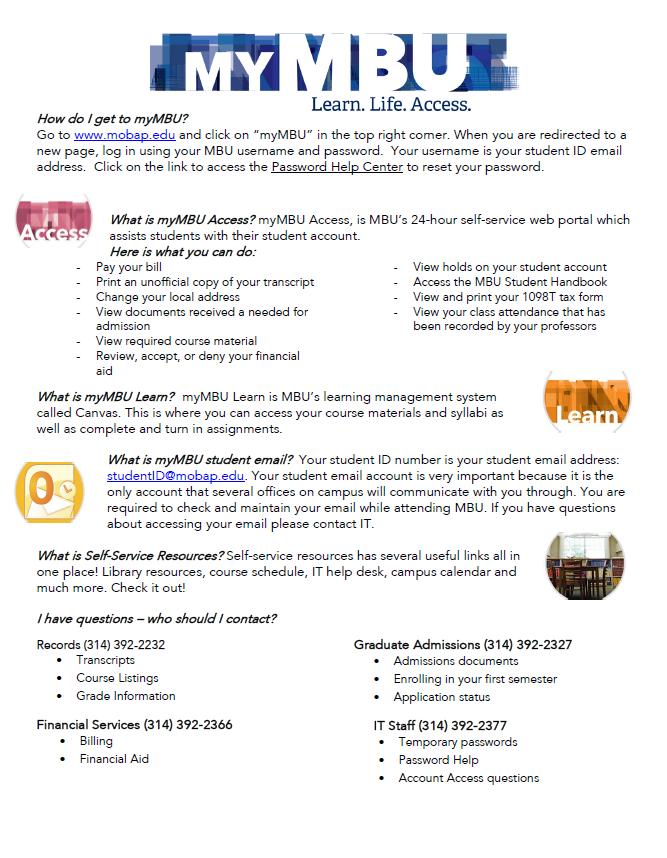
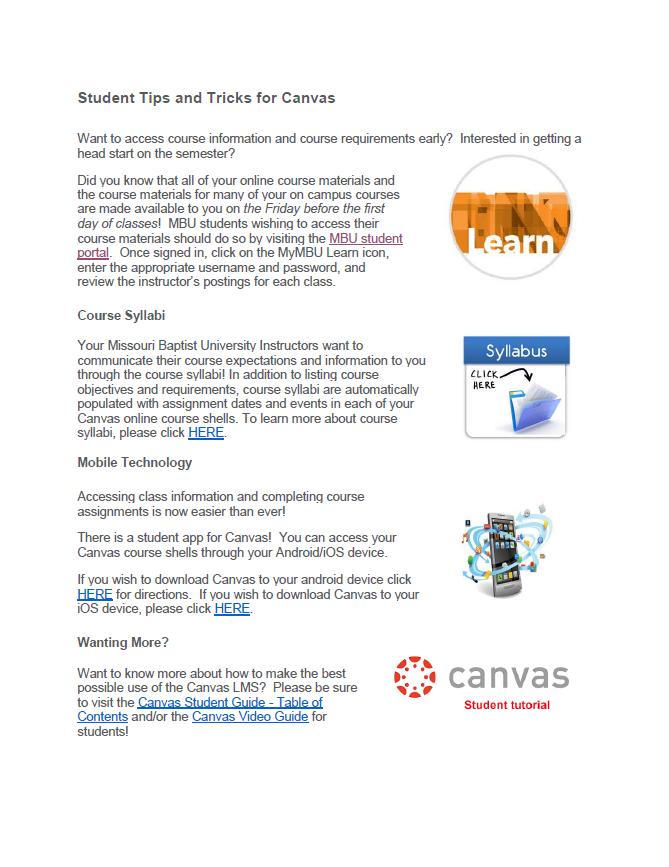
DOCTOR OF EDUCATION
LEADERSHIP IN TEACHING AND LEARNING
(Graduate Bulletin 2022-2023)
Student Semester of Initial Enrollment
Cohort E-mail
Doctoral level graduate students must earn a grade of B or better in doctoral level courses in order to continue in the Doctor of Education program A student who receives a grade lower than B will be asked to withdraw from the doctoral program
REQUIRED CORE: 24 HOURS Satisfied/Semester Grade
GRED 703 Statistics and Methods I (Or equivalent within 7 years)
EDAD 743 Introduction to the Dissertation
EDUC 723 Transformational Theories and Applications*
EDUC 733 Leading Teaching and Learning in Diverse and Emerging Educational Settings
GRED 753 Methods of Inquiry II: Quantitative Analysis
GRED 763 Methods of Inquiry III: Qualitative Analysis
GRED 786 Doctoral Dissertation
* Online Course
TOTAL: 24 HOURS (with Prerequisite)
Student’s Signature
Date
Date Student Services
Coordinator of Doctoral
Associate Vice President for
Date Graduate Affairs
NOTE: Not all classes offered on all campuses.
DOCTOR OF EDUCATION IN HIGHER EDUCATION LEADERSHIP (Graduate Bulletin 2022-2023)
Student Semester of Initial Enrollment
Cohort E-mail
Doctoral level graduate students must earn a grade of B or better in doctoral level courses in order to continue in the Doctor of Education program. A student who receives a grade lower than B will be asked to withdraw from the doctoral program.
REQUIRED CORE: 42 Hours Satisfied/Semester Grade
HEDD 743 American Higher Education
HEDD 703 Dissertation Seminar
HEDD 783 College Student Development
HEDD 763 Critical Issues in Higher Education and Diversity
HEDD 753 Higher Education Law/Ethics
EDAD 733 Higher Education Finance
HEDD 723 Higher Education Leadership and Strategic Planning
EDAD 763 Enrollment Management in Higher Education
HERM 723 Research I: Intro to Scholarly Inquiry
HERM 733 Research II: Survey of Methodology & Design
HERM 743 Research III: Application of Methods
HERM 753 Research IV: Research Hours and Proposal Capstone
HERM 763 Research V: Analyzing and Reporting Data
HERM 783 Research VI: Research Hours & Final Dissertation Capstone
TOTAL: 42 HOURS
Has met residency requirement: YES NO
Student’s Signature Date _____________
Advisor’s Signature __________________________________________________ ____ Date __
Associate Vice President for Date ____________ Graduate Affairs
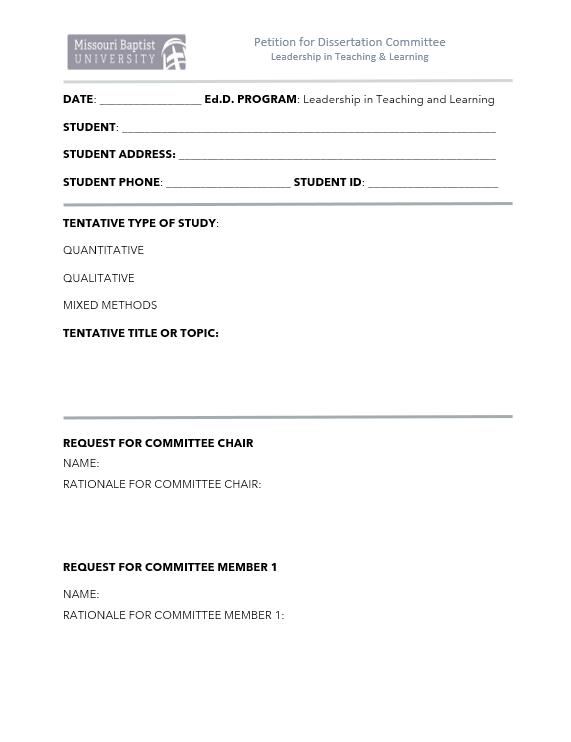
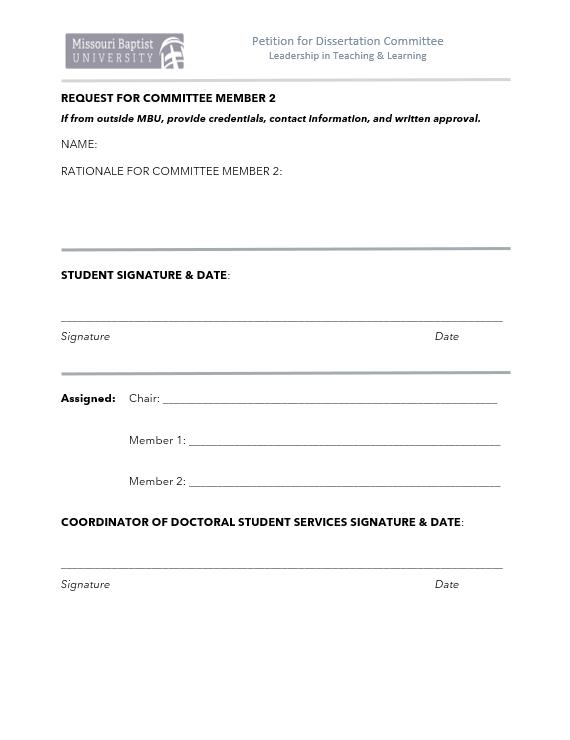
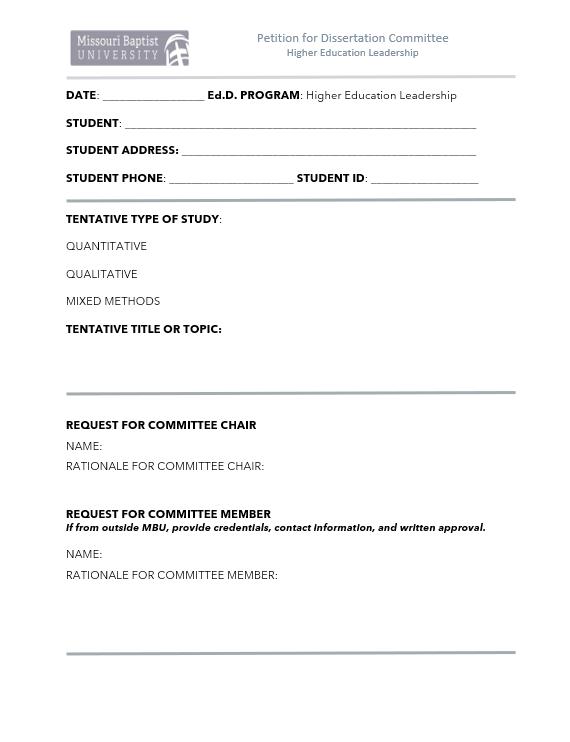
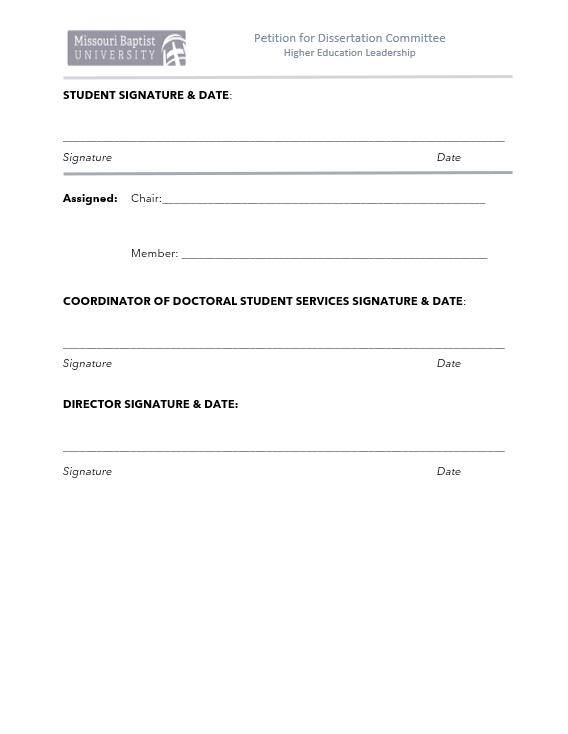
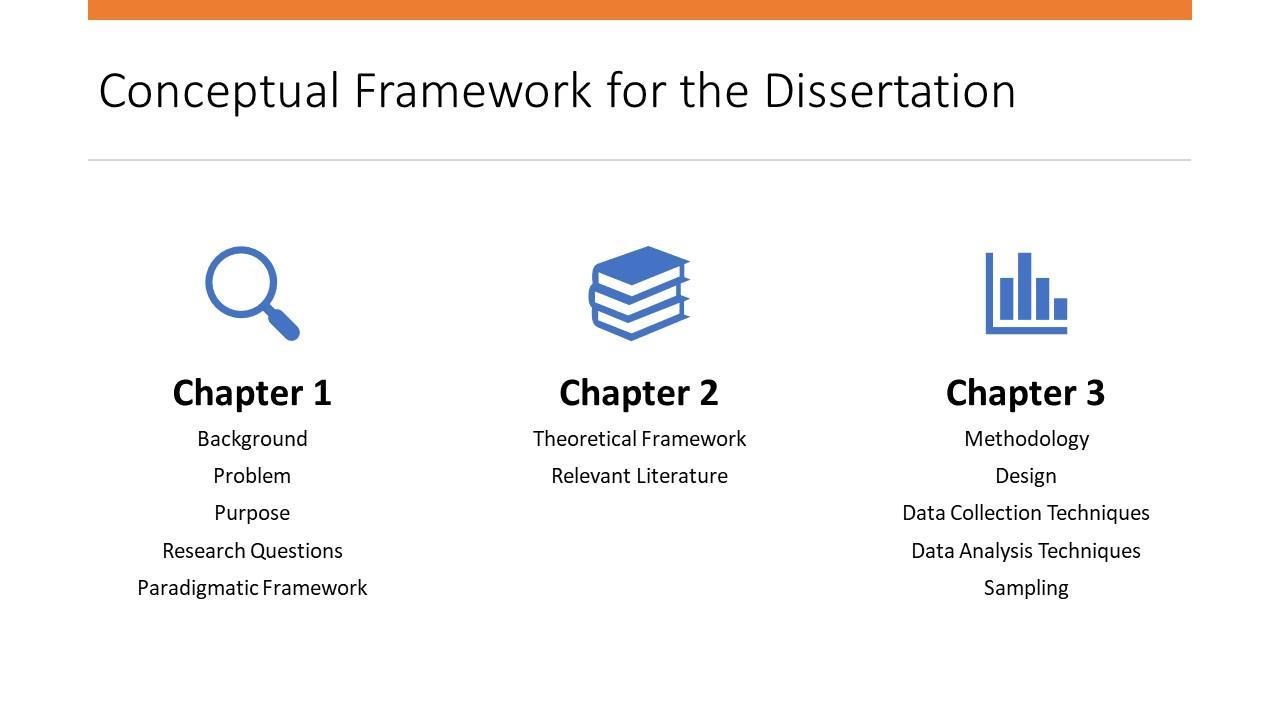
Type answers within the rows below. Cells will expand upon typing.
Date
Student’s Name
Student’s ID
Directions: In the fields below, students will provide an explanation to the categories of the dissertation that are identified as the conceptual framework for the EdD at Missouri Baptist University. The committee will only review forms that are brief and concise in their explanations. That is, students should not copy paragraphs from their proposal. Instead, when an explanation or summary is appropriate, they should aim to articulate their response in no more than 6-8 sentences and cite the appropriate literature throughout.
Proposal Title (can be tentative and subject to change).
Provide your problem statement here with evidence cited from the literature.

Identify your study’s paradigmatic framework and explain why this is appropriate for your study.
Provide your study’s purpose statement here.
Provide your study’s research question(s) here. (i.e., broad question derived from problem/purpose)
*If quantitative, you will need the hypothesis in addition to the research question(s). (i.e., null and alternative format for each quantitative RQ)
Identify and summarize your study’s theoretical framework and explain how that theory is connected to your study’s purpose. Cite the appropriate literature.
Identify your study’s methodology here. Cite the appropriate literature.
Identify the study’s design here. Your design should be appropriate for the methodology you’ve mentioned above. Cite the appropriate literature.
Identify which sampling technique are you using and how will you recruit participants for your study. Cite the appropriate literature.
Explain how you will gather data for your study (i.e., interviews, surveys, questionnaires, focus groups, observations, archival data, testing, assessment, etc.) AND how each source of data will help answer your question or test your hypothesis.
Explain your data analysis plan. Cite the appropriate literature.
Type the names of the individuals below.
Principal Investigator (Student)
Committee Chair Committee Member
Committee Member (when applicable)
Student: please submit this form as a WORD document to the Ed.D. Office at doctorate@mobap.edu. The EdD Office will follow-up with a request for electronic signatures, indicating the approval of the Pre-Proposal Defense.
Your signature indicates that you have participated in all the required processes and approve the research plan.

Principal Investigator (Student)
Dissertation Committee Chair
Ed.D. Program Director
PPD Coach and Methodologist
PPD Coach and Methodologist
Ed.D. Office Use Only
Pre-Proposal Defense Date and Time:
Approved
CAMS
Spreadsheet
